
A ninja or shinobi was an infiltration agent, mercenary, or guerrilla warfare and later bodyguard expert in feudal Japan. They were often employed in siege, espionage missions, and military deception. They often appear in the historical record during the Sengoku period, although antecedents may have existed as early as the 12th century.

Yagyū Munenori was a Japanese daimyo, swordsman, and martial arts writer, founder of the Edo branch of Yagyū Shinkage-ryū, which he learned from his father Yagyū "Sekishūsai" Muneyoshi. This was one of two official sword styles patronized by the Tokugawa shogunate. Munenori began his career in the Tokugawa administration as a hatamoto, a direct retainer of the Tokugawa house, and later had his income raised to 10,000 koku, making him a minor fudai daimyō, with landholdings around his ancestral village of Yagyū-zato. He also received the title of Tajima no Kami (但馬守).

The siege of Osaka was a series of battles undertaken by the Japanese Tokugawa shogunate against the Toyotomi clan, and ending in that clan's destruction. Divided into two stages, the winter campaign and the summer campaign, it lasted from 1614 to 1615. The siege put an end to the last major armed opposition to the establishment of the Tokugawa shogunate. The end of the conflict is sometimes called the Genna Armistice, because the era name was changed from Keichō to Genna immediately following the siege.
Yagyū Jūbē Mitsuyoshi was one of the most famous and romanticized of the samurai in Japan's feudal era.
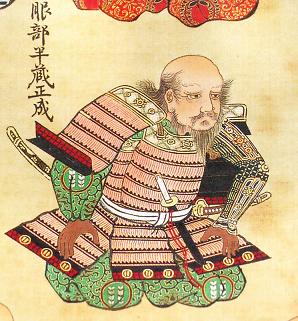
Hattori Hanzō or Second Hanzō, nicknamed Oni no Hanzō, was a famous samurai of the Sengoku era, who served the Tokugawa clan as a general, credited with saving the life of Tokugawa Ieyasu and then helping him to become the ruler of united Japan. He is often a subject of various portrayals in modern popular culture.
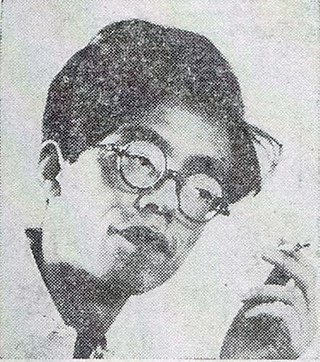
Futaro Yamada was the pen name of Seiya Yamada, a Japanese author. He was born in Yabu, Hyogo. In 1947, he wrote a mystery short story Daruma-tōge no Jiken and was awarded a prize by the magazine Houseki (宝石). He was discovered by Edogawa Rampo and became a novelist. He wrote many ninja and mystery stories. Many of his works have been adapted for film, TV, manga, and anime.

The Oniwaban (御庭番) or niwaban (庭番) was a group of government-employed undercover agents (onmitsu), established by the 8th Tokugawa shōgun, Tokugawa Yoshimune (1684–1751). They were under the direct command of the shōgun and were in charge of undercover intelligence operations. In actuality, their work consisted more often of reporting any news about the city of Edo to the shōgun or remaining incognito to inspect and report on the states of affairs in the countryside. Their activities were comparable to those of the inspectors and general inspectors of the shogunate albeit under the direct orders from the shōgun.
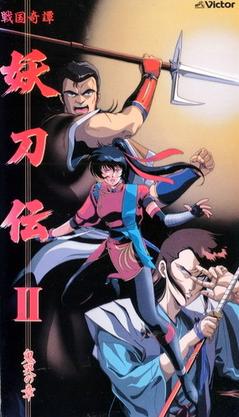
Yōtōden is a 3-episode Japanese original video animation produced by J.C.Staff, the studio's first production. In 1989, Yōtōden was re-edited into a feature film version titled Wrath of the Ninja for English-speaking regions, but is currently out of print. A manga adaptation was serialized in Newtype.
Ninja Scroll: The Series is a 2003 Japanese anime television series that serves as a sequel to Yoshiaki Kawajiri's Ninja Scroll. The series is directed by Tatsuo Sato and animated by Madhouse.

Basilisk is a Japanese manga series based on the 1958 novel The Kouga Ninja Scrolls written by Futaro Yamada and illustrated by Masaki Segawa. It was serialized in Kodansha's seinen manga magazine Young Magazine Uppers from February 2003 to July 2004. The story takes place in the year 1614. Two ninja clans, Iga of Tsubagakure and the Kouga of Manjidani, battle each other to determine which grandson of Tokugawa Ieyasu will become the next shogun. The deadly competition between 10 elite ninja from each clan unleashes a centuries-old hatred that threatens to destroy all hope for peace between them.
Fūma Kotarō was the name adopted by the leader of the ninja Fūma clan during the Sengoku era of feudal Japan. He was a retainer of the Later Hōjō clan. According to some records, his name was originally Kazama Kotarō.
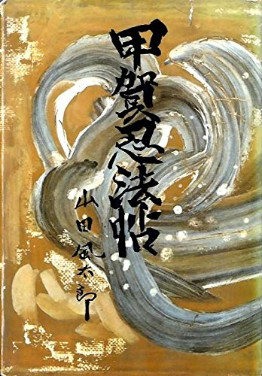
The Kouga Ninja Scrolls is a historical fantasy novel about ninja written in 1958–1959 by the Japanese author Futaro Yamada. It is the first installment in Yamada's Ninja Scrolls series, which he wrote until his death in 2001. The book was translated into English by Geoff Sant, and published by Del Rey in December 2006.
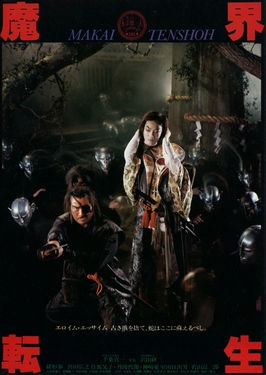
Samurai Reincarnation is a 1981 Japanese dark fantasy film written and directed by Kinji Fukasaku and starring Sonny Chiba, Kenji Sawada, and Hiroyuki Sanada. It is based on the novel of the same name by Futaro Yamada.
Iga-ryū is an umbrella term for ninjutsu traditions that come from the Iga region, according to Japanese legend. It became one of the two most well-known ninja traditions in Japan. The Iga-ryū traditions originated in the Iga Province in the area around the towns of Iga, Ueno, and Nabari. Iga-mono is a synonym for Iga ninja.

The Blade of the Courtesans is a historical fiction novel by Japanese author Keiichiro Ryu originally published in 1986. It was published in English by Vertical Inc in 2008. Ryu's debut novel, it was nominated for a Naoki Award and "instantly made him a doyen of historical fiction."
Unmeitōge is a Japanese jidaigeki or period drama that was broadcast in prime-time in 1974. It is based on Renzaburō Shibata's novel of the same title. The lead star is Masakazu Tamura.
Hatsume no Tsubone (初芽局) is a fictitious Japanese woman from the Sengoku period. She is famous as the main character of the historical novel Sekigahara by Ryōtarō Shiba. In the novel, she is a kunoichi sent by Tokugawa Ieyasu to spy on his political enemy Ishida Mitsunari before the Battle of Sekigahara.
The Order of Musashi Shinobi Samurai is a Japanese shinobisamurai clan which served Tokugawa Ieyasu and the Edo Shogunate from 1582 to 1868. They served the Tokugawa Shogunate as intelligence operatives called onmitsu, and metsuke (inspectors), and in the 19th century, as diplomats. When the political system changed due to the restoration of the monarchy in 1868, it became independent. The order consists of a number of families and people who have built close relations of trust with the Shibata Clan of the Musashi Province.











